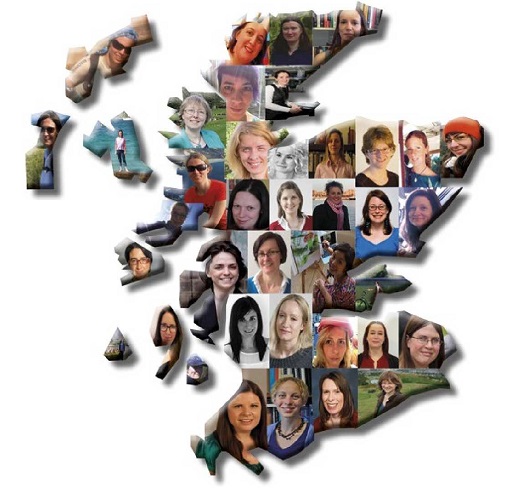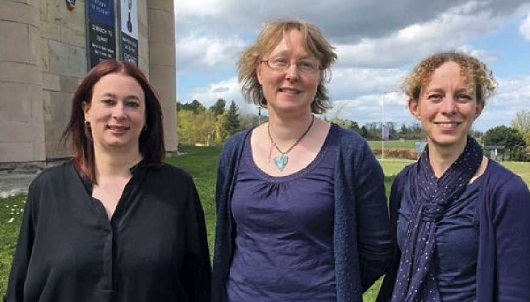Women still fail to reach top jobs

A new drive to inspire women to strive for the top jobs in higher education is showcasing the careers of successful female academics.
Women in Academia Now hopes to tackle the still low numbers of senior women in universities, despite growing recognition in the corporate world that the talents and expertise of women bring enormous benefits.
Led by female academics at the University of St Andrews: Dr Aileen Fyfe of the School of History, Professor Ineke De Moortel of the School of Mathematics and Professor Sharon Ashbrook of the School of Chemistry, the project was supported by the Young Academy of Scotland, the Royal Society of Edinburgh and the Wellcome Trust.
Campaigning to encourage women into academia has traditionally focused on the fields of science, technology and medicine. But even in disciplines with more women overall, most of those women are early or mid-career: few are reaching the most senior levels of academic recognition.
The new booklet has been published detailing the careers of female members of the Young Academy of Scotland, which recognises emerging leaders in science and the humanities, revealing their routes to success by discipline, personal circumstances and opportunities.
The new initiative reveals that fellowships are very beneficial to careers and that overseas appointments may be key to success. From the sample of careers highlighted only 10 of the 33 women made their careers entirely in Britain. The rest include 14 migrants (predominantly from the EU and North America), and seven Britons who have spent some time abroad.
A key statistic is that half of those in the sciences held long-term (5+ years) personal fellowships, such as a Royal Society University Research Fellowship or an RCUK fellowship, early in their careers indicating these fellowships are crucial in enabling those women to gain permanent positions, establish their research teams and, in some cases, start their families.
It is also suggested that a lack of fellowships in humanities may be a barrier to women in this area.

Dr Fyfe, who is also a member of the Young Academy of Scotland, said: “The female academic members of the Young Academy of Scotland provide a fantastic window onto the career paths of current mid-career women in academia, a career-stage that is often overlooked amidst advice to early-career women and celebrations of senior women as role models. These women show us what academia looks like for women now.”
The brochure aims to facilitate and inspire further discussion and study about the career progression of women in different disciplines across the entire range of academic disciplines. By focusing on the mid-career stage, it offers a set of role models for early career researchers, many of whom still harbour doubts about whether academia is a good career for women.
Launch:
The booklet Academic Women Now: experiences of mid-career academic women in Scotland was launched by Dame Jocelyn Bell-Burnell (president, Royal Society of Edinburgh) on Thursday 9 June at the Royal Society of Edinburgh.
Read Academic Women Now: experiences of mid-career academic women in Scotland online now.
Notes to news editors
The ‘Women in Academia Now: experiences of mid-career academic women in Scotland’ project was managed by Dr Aileen Fyfe (History), Professor Ineke De Moortel (Mathematics) and Professor Sharon Ashbrook (Chemistry), all of the University of St Andrews, and all founder members of the Young Academy. The project received support from the Young Academy of Scotland, the Royal Society of Edinburgh, the University of St Andrews and the Wellcome Trust.
About the Young Academy of Scotland:
The RSE Young Academy of Scotland fosters interdisciplinary activities among emerging leaders from the disciplines of science and humanities, the professions, the arts, business and civil society. Established by the Royal Society of Edinburgh in 2011, the Young Academy of Scotland provides a platform for able and innovative young entrepreneurs, professionals and academics to develop a coherent and influential voice, and to address the most challenging issues facing society in Scotland and beyond.
The Young Academy of Scotland is part of a growing international movement in which national academies are establishing young academies across Europe and beyond. It currently has 151 members, of whom 46% are female. The average age on appointment is 37 years, and the term of membership is five years. In 2015, the Young Academy launched a five-year strategic plan, called ‘2020 Vision’.
Photo credits
Top: Cover of Women in Academia booklet
Bottom: (from left) Professor Sharon Ashbrook, Dr Aileen Fyfe and Professor Ineke De Moortel
Issued by the University of St Andrews Communications Office, contactable on 01334 462530 or [email protected].
Brexit round up? Steve?
Category Public interest stories